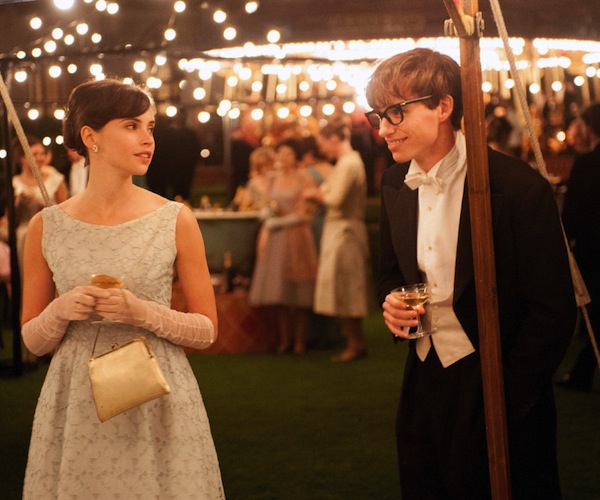Film Review: “The Theory of Everything” — Hey, It Turns Out All You Need Is Love
The irony is that there is precious little theory in The Theory of Everything — no real exploration of Stephen Hawking’s ideas and what makes them so important.
The Theory of Everything, directed by James Marsh. Screening throughout New England

Felicity Jones, left, stars as Jane Wilde and Eddie Redmayne stars as Stephen Hawking in “The Theory of Everything.”
By Paul Dervis
This is not going to be a popular review. I am quite sure that The Theory of Everything will clean up at the Oscars and undoubtedly Jóhann Jóhannsson will receive a nomination for Best Score, but it was the music that ultimately sank this project. It has all the nuance of a steamroller. Even if you don’t understand the English language you will most likely be able to easily follow the emotional through-line of this film: the music painstakingly dictates how you are supposed to feel at every moment. Not since E.T. has a movie’s soundtrack manipulated an audience in so ham-fisted a manner.
Not that filmmaker James Marsh had any interest in making the viewer do any heavy thinking. Marsh, who has directed several documentaries such as The Team, Project Nim, and the critically acclaimed 2008 film Man on Wire, hasn’t approached this material with a smidgeon of critical distance. The script is based on an air-brushed memoir by Stephen Hawking’s loving ex-wife, Jane. Needless to say, in her account of things everything from black holes to blemishes look downright beautiful.
The story starts in 1962 at Cambridge, where Hawking was working toward his PhD and Jane was a Liberal Arts major studying poetry. An unlikely pair…he, an atheist, she a true believer. He a scientist, she a poet. He, a shy, oafish, gawky man-child; she a beauty attracting handsome, buff boys.
But they fall in love…awfully fast. And he gets diagnosed just as quickly. Given two years to live, he tries to break off the relationship but she will not hear of it. The film follows the next two decades of their lives, touching on the couple’s three children, academic success, and world fame. There is never any explanation as to how, fifty years later, Hawking still remains alive and vital. That would have been a fascinating part of the story to explore, but it is never examined… aside from credit being given to the fact that love conquers all.
The hardship of dealing with a slowly deteriorating genius is handled in a very cursory way. We sense how difficult life becomes for both people, but the days of gritty nightmare are never really dramatized. Jane seems burdened, but not all that frustrated. Even their diminishing sex life is greeting with saintly equanimity between the two. She becomes enamoured with her church’s Choir Director, who recently lost his wife after a long illness. He becomes virtually a part of the family, helping nurse Hawking and only loving Jane from afar…at least until the marriage evolves into a strictly platonic pairing.
Interestingly, little time is devoted to Hawking’s actual life’s work, his considerable intellectual accomplishments. Sure, we are made aware of his theories as well as the obstacles that he and Jane faced as he struggled to complete his writings and have them published. We see the cover of his book A Brief History of Time. The irony is that there is precious little theory in The Theory of Everything — no real exploration of the man’s ideas and what makes them so important.
The casting of both Eddie Redmayne and Felicity Jones were interesting choices. While both are fine actors, neither are particularly powerful presences on the screen. In scenes that call for expressions of deep pain, we are given sentimental sadness, teary sap. Even when infidelity crept into the relationship the revelation was sugared over.
The two leads, both in their early thirties, look even younger. Their puppy-dog appearance was perfect for the film’s University years, but played less convincingly when the characters became older…and little was done to artificially age them. Even as the pair were approaching middle age, both could still pass as undergrads. (Perhaps Hawking has discovered the Fountain of Youth?)
There was a plush, soap-opera feel to this film, complete with soft-focused images and self-consciously quaint dialogue. The inspirational takeaway from The Theory of Everything is that we live in an oh-so-gentle world, where the harshness of reality can be overcome by the ever-present kindness of our fellow man….and, of course, the love of a good woman.
Paul Dervis has been teaching drama in Canada at Algonquin College as well as the theatre conservatory Ottawa School of Speech & Drama for the past 15 years. Previously he ran theatre companies in Boston, New York, and Montreal. He has directed over 150 stage productions, receiving two dozen awards for his work. Paul has also directed six films, the most recent being 2011’s The Righteous Tithe.
Tagged: A Brief History of Time, Eddie Redmayne, Felicity Jones, Johann Johannsson, Paul Dervis, Stephen Hawking
